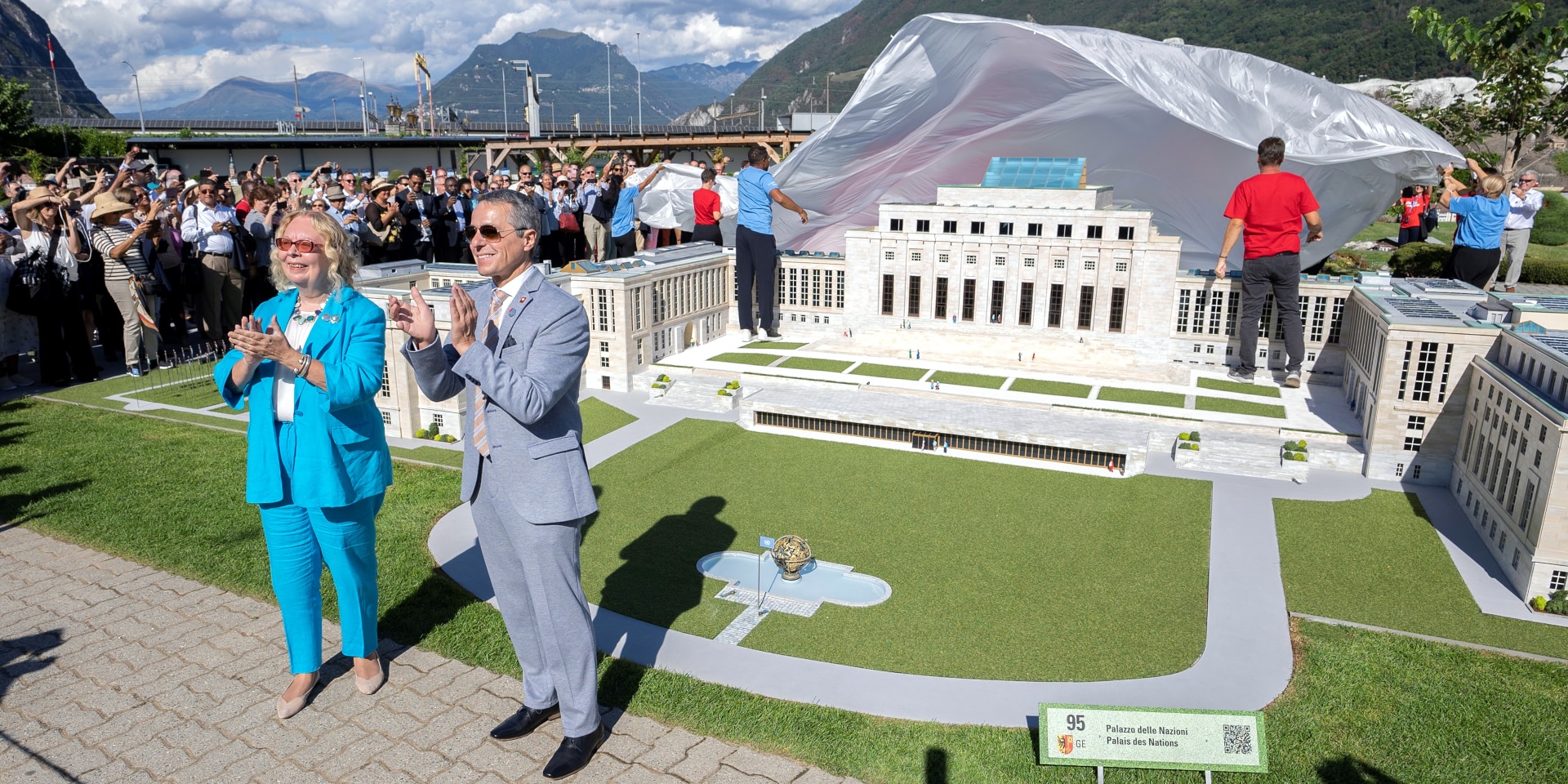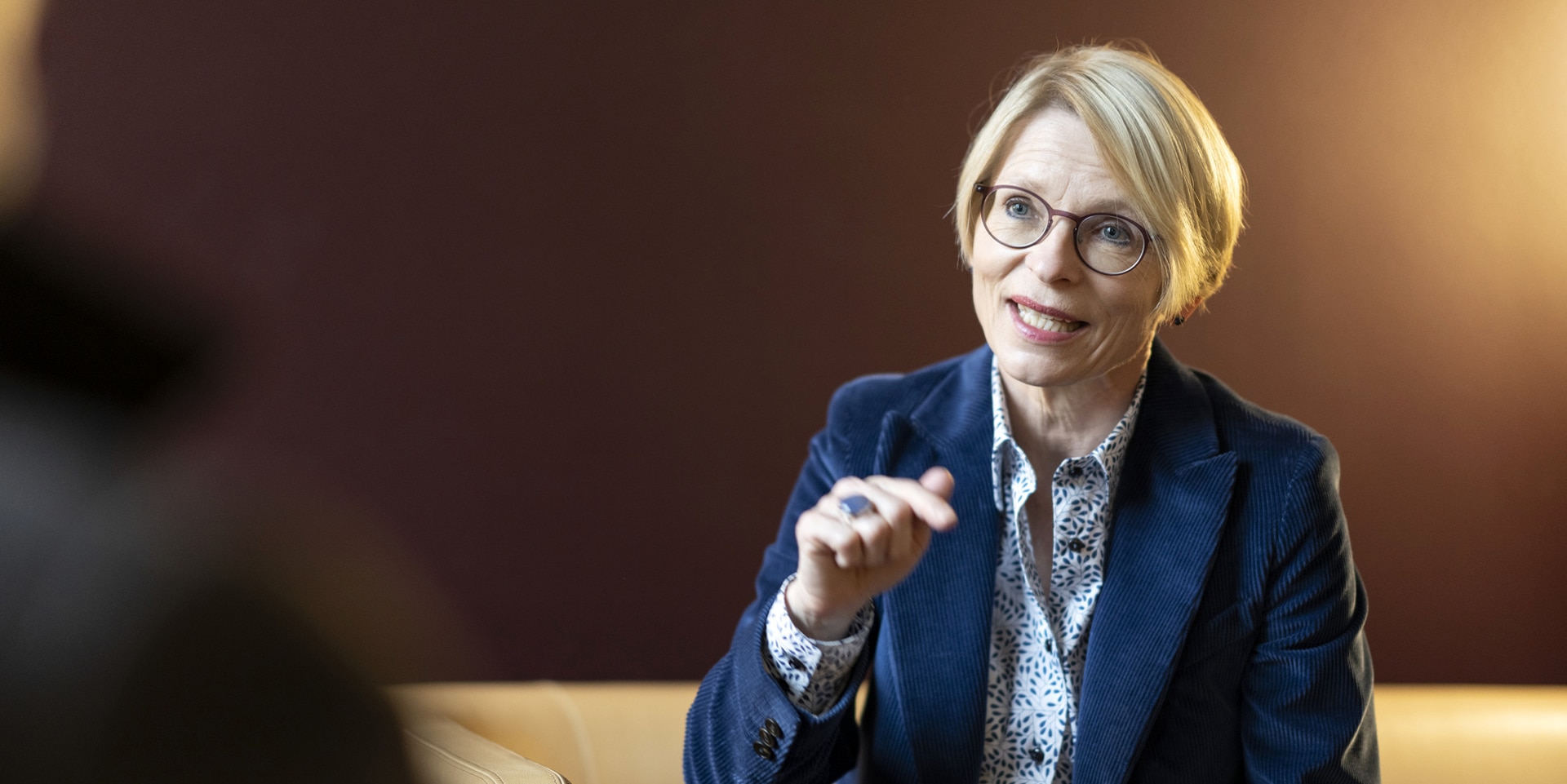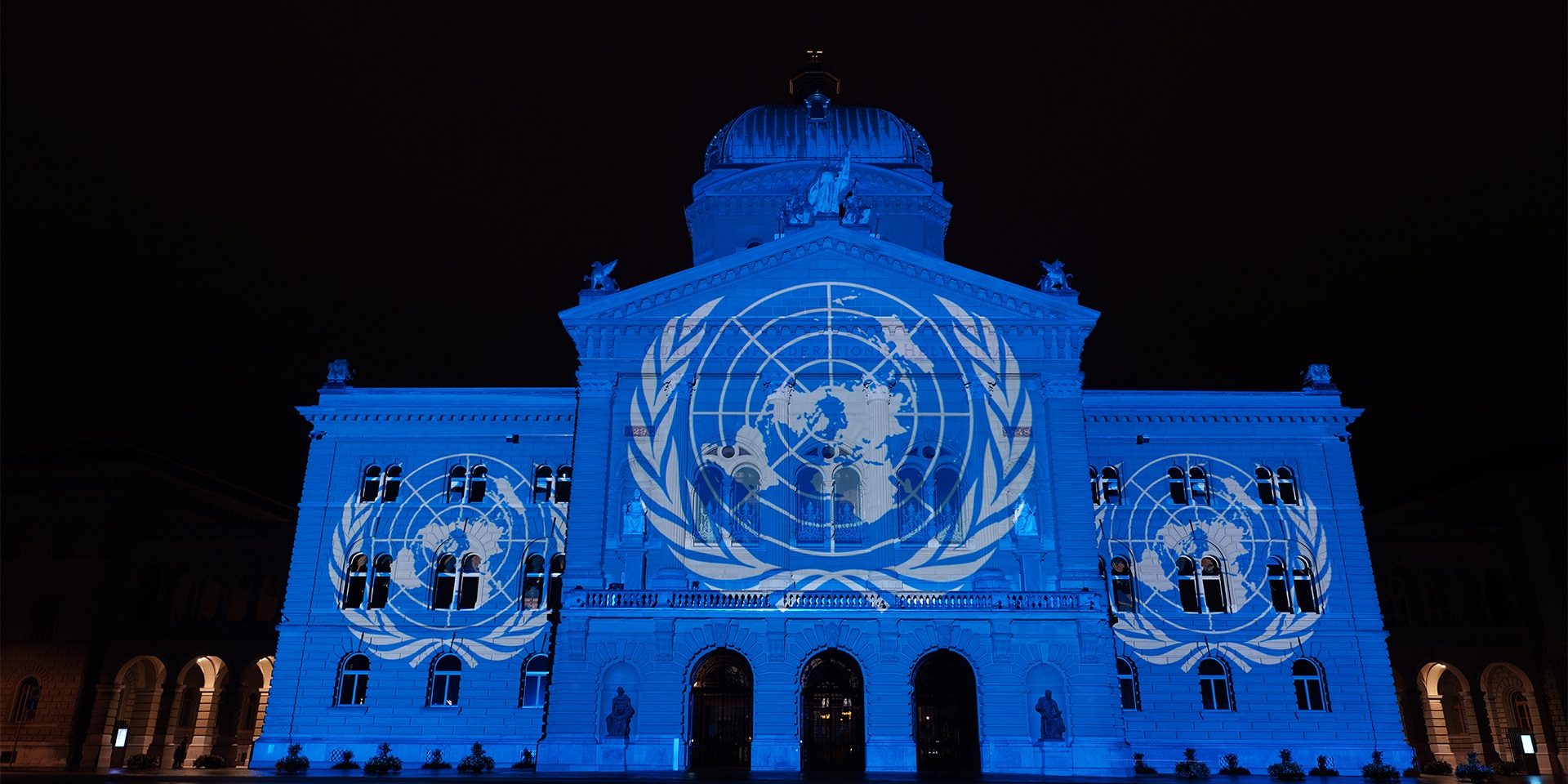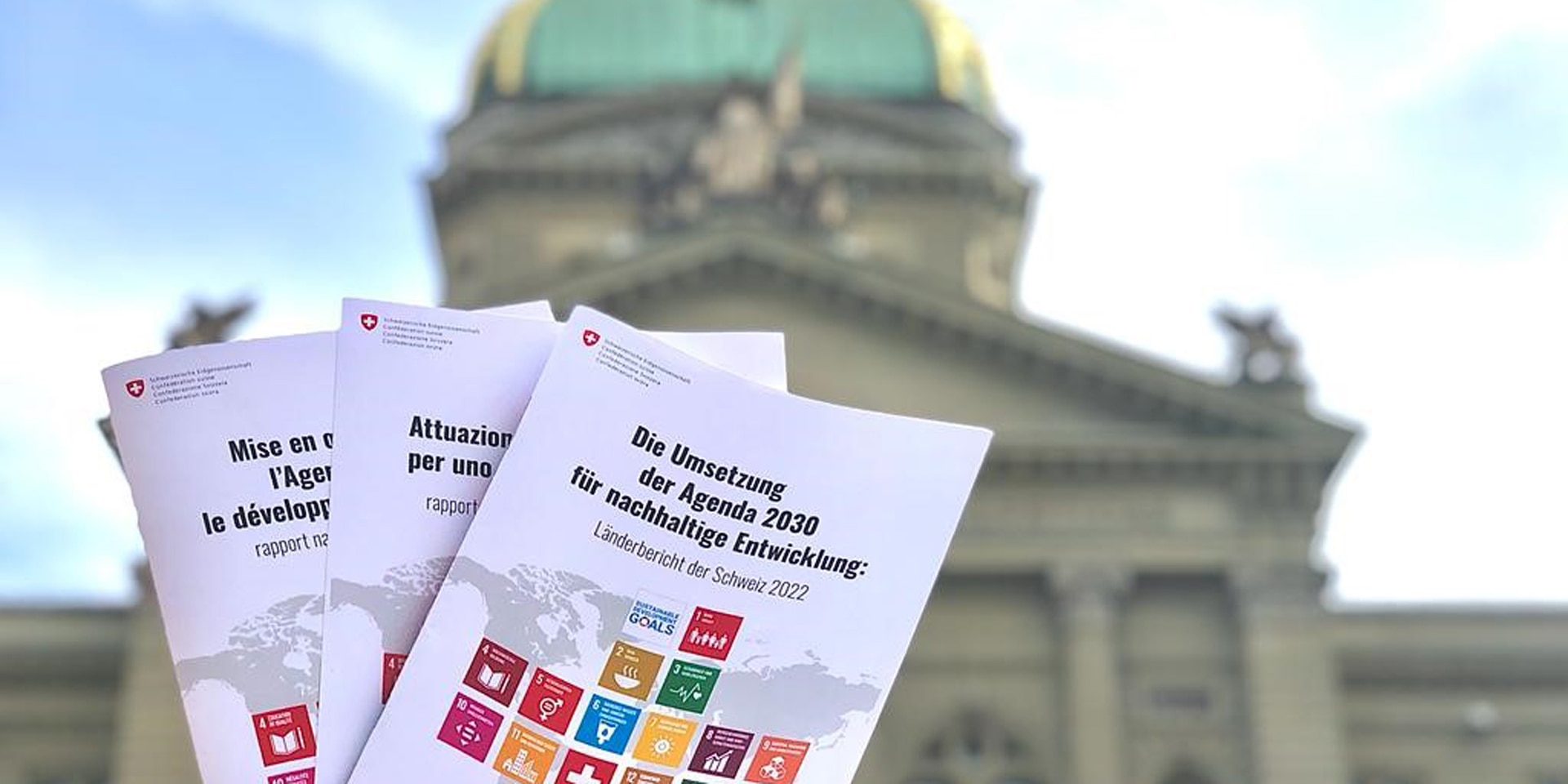"The people got it right"
Appearing at Swissminiatur together with the foreign diplomatic corps, on 10 September 2022 President Cassis praised Switzerland's decision to join the UN 20 years ago and inaugurated a model of the Palais des Nations at the park in Melide (canton Ticino) as a tribute to International Geneva and a symbol of effective multilateralism. Read on for more on what was said at the time of accession, Switzerland's achievements since then, and the new challenges in today's climate of crisis.
"Today is a special day. It is exactly 20 years to this day that Switzerland became a member of the United Nations," stated President Cassis in the presence of the 100 foreign diplomats invited to attend the ceremony in Melide at Swissminiatur. He went on to inaugurate a model of the UN's European headquarters, the Palais des Nations, which has been given a central location in the Swissminiatur park. The ceremony was also attended by the director general of the United Nations Office at Geneva, Tatiana Valovaya.

The Palais des Nations model at Swissminiatur symbolises the global relevance of multilateralism, particularly in today's climate of crisis, and how the international community must join forces to tackle global challenges. The Latin phrase on the Federal Palace dome in Bern – Unus pro omnibus, omnes pro uno (one for all, all for one) – is also the unofficial motto of Switzerland. "It both reflects Switzerland's humanitarian tradition and the UN's goal of effective multilateralism," explained President Cassis.
What has Switzerland achieved in the last 20 years?
Switzerland is the only country in the world to have joined the UN after a popular vote. "Looking back on the last two decades, we can see that the people got it right. Since Switzerland's accession, it has achieved a number of important successes at the UN," Mr Cassis emphasised in front of the diplomatic corps. This includes the creation in 2006 of the Human Rights Council (HRC), in which Switzerland played a key role.
Since then, the HRC has been able to set important priorities such as its special sessions and urgent debates over the last two years on Myanmar, Afghanistan, Sudan and Ukraine. The HRC was also instrumental in establishing the right to a healthy environment.
Driving force behind the 2030 Agenda
Switzerland was also a driving force behind the 2030 Agenda and its 17 Sustainable Development Goals (SDGs). The 2030 Agenda is a global framework for addressing the world's major challenges – extreme poverty, climate change, ecocide, food security and health crises. All 193 UN member states adopted the Agenda in 2015 and declared their willingness to join forces to achieve the SDGs by 2030.
Global challenges are increasingly complex in nature, requiring science-based and intellectual sophistication. Switzerland is seen as one of the most innovative countries in the world and is home to world-renowned universities – precisely the environment for producing the experts the world needs for the solutions of today and tomorrow. Implementing the SDGs has become more difficult due to the war in Ukraine and the COVID-19 pandemic. The international community will have to scale up their efforts if the SDGs are to be achieved. This is something Switzerland actively pursues at the UN. Switzerland's country report on its national implementation of the SDGs in mid-July 2022 shows that the country is on course. However, according to the Swiss delegate for the 2030 Agenda Jacques Ducrest, Switzerland also needs to pick up the pace.
"Politics in the noblest sense of the word"
Back in Melide, President Cassis highlighted the fact that "the spirit of Geneva could now also be felt on Lake Lugano" with the Swissminiatur model representing International Geneva – one of the UN's four headquarters along with New York, Vienna and Nairobi. In 2019 alone, this "engine room of the global system" hosted some 3,200 international conferences and 4,700 high-level meetings on the shores of Lake Geneva. Thanks to its dense network of innovative, scientific and international organisations, representations and NGOs, the city has become the place for in-depth exchange and a centre of global governance.
"In Geneva, politics are carried out in the noblest sense of the word – to solve everyday problems for people like health, work, human rights or migration," explains former Federal Councillor Ruth Dreifuss in an interview (see video).
Swiss people working for the UN
More than 1,000 Swiss people are putting their skills to use at the UN, just under half of whom are in the higher and top management levels. In 2010, the office of the President of the UN General Assembly – which is the highest office in the UN – was held by a former head of the FDFA and EAER. "It was a chance for me to prove to my fellow citizens that it was possible for Switzerland to assume a greater role at international level without giving up our fundamental values," remembers former Federal Councillor Deiss.
A strong sign of confidence in Switzerland
Over the past two decades, Switzerland has proven itself to be a credible partner with a strong sense of solidarity for the international community. "But the biggest task still lies head of us: Switzerland's seat on the UN Security Council for 2023–24," stated President Cassis. Switzerland's election to the Security Council as a non-permanent member on 9 June 2022 clearly demonstrates the support and trust it enjoys within the international community. During its one-year term, Switzerland will focus on sustainable peace, the protection of civilians, strengthening the Security Council's effectiveness, and climate security.
Switzerland and the UN
Switzerland's foreign policy goals, which are enshrined in the Federal Constitution, are aligned with those of the UN: world peace and security, respect for human rights, the alleviation of need and poverty, and sustainable development. These global challenges cannot be tackled, let alone solved, by one state alone. In its capacity as the platform for the international community of states therefore, the UN can facilitate dialogue, the forging of new ideas, and standard setting in these areas. At the UN, Switzerland also safeguards its own interests and assumes its role with responsibility.
During this turning point in history marked by war in Europe and the ongoing impact of the COVID-19 pandemic, Switzerland is committed to scaling up multilateral efforts for the major issues facing the world today – war, extreme poverty, energy and global economic crises. To this end, we need decisive multilateral action within the UN framework as well as binding, commonly accepted rules and reform efforts that will enable us to address the challenges of the day.



